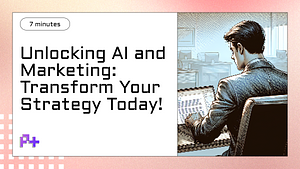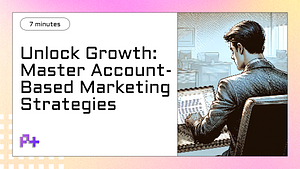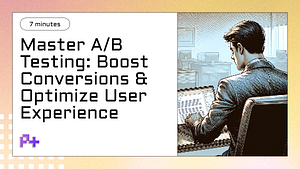1. What is Marketing Automation and How Does It Work?
Marketing automation refers to the use of software and tools to streamline, automate, and measure marketing tasks and workflows. By leveraging technology, businesses can enhance their marketing efforts, improve efficiency, and deliver personalized experiences to their customers. Common functions of marketing automation include email marketing, social media posting, lead generation, and customer segmentation. This powerful tool allows marketers to automate repetitive tasks, allowing them to focus on strategy and creativity while ensuring that their marketing campaigns run smoothly and effectively.
The way marketing automation works is fairly straightforward. First, businesses implement marketing automation software that integrates with their existing systems, such as customer relationship management (CRM) platforms and email marketing tools. Once set up, marketers can create automated workflows based on specific triggers or actions taken by users, such as signing up for a newsletter or downloading a resource. For instance, when a potential customer fills out a contact form, the marketing automation system can automatically send a welcome email, nurture the lead with targeted content, and track their engagement over time. This not only saves time but also ensures that potential customers receive consistent communication tailored to their interests.
The benefits of marketing automation are vast. It helps businesses nurture leads through personalized experiences, significantly increasing the chances of conversion. Additionally, it provides valuable insights and analytics, enabling marketers to measure the performance of their campaigns and optimize their strategies based on real-time data. With features like A/B testing and customer behavior tracking, marketing automation empowers businesses to make informed decisions and enhance their overall marketing effectiveness. In an increasingly competitive landscape, embracing marketing automation is essential for organizations looking to improve their outreach and engagement strategies while maximizing their return on investment (ROI).
2. The Benefits of Marketing Automation for Your Business
Marketing automation has become an essential tool for businesses looking to streamline their marketing efforts and drive better results. One of the primary benefits of marketing automation is its ability to save time and resources. By automating repetitive tasks such as email campaigns, social media posting, and lead nurturing, businesses can focus on more strategic initiatives. This not only enhances productivity but also allows marketing teams to allocate their time and effort to creative and analytical tasks that require human insight, ultimately leading to improved campaign effectiveness.
Another significant advantage of marketing automation is the ability to deliver personalized experiences at scale. With advanced segmentation and targeting features, businesses can tailor their messages to specific audience segments based on behavior, demographics, and preferences. This level of personalization boosts engagement rates, as customers are more likely to respond positively to content that resonates with their individual needs. Moreover, marketing automation platforms often provide data analytics that help businesses track customer interactions and preferences, enabling them to refine their strategies continuously and create more impactful campaigns.
Lastly, marketing automation enhances lead generation and conversion rates. Automated workflows can nurture leads through the sales funnel by providing timely follow-ups, relevant content, and targeted promotions. This ensures that potential customers receive the right information at the right time, increasing the likelihood of conversion. Additionally, by analyzing data from marketing automation tools, businesses can identify trends and optimize their sales processes, leading to higher return on investment (ROI). In summary, implementing marketing automation not only streamlines operations but also significantly enhances customer engagement and drives revenue growth for businesses of all sizes.
3. Integrating Marketing Automation with Your CRM
Integrating marketing automation with your Customer Relationship Management (CRM) system is a game-changer for businesses looking to streamline their marketing efforts and enhance customer interactions. By connecting these two powerful tools, organizations can leverage their CRM data to create personalized marketing campaigns that resonate with their target audience. This integration allows for a seamless flow of information, enabling marketers to track customer behavior, preferences, and engagement across various touchpoints. As a result, businesses can deliver timely and relevant content that nurtures leads and improves conversion rates.
One of the key benefits of integrating marketing automation with your CRM is the ability to automate repetitive tasks, such as email marketing, lead scoring, and follow-up reminders. This not only saves time but also ensures that no lead is left unattended. For example, when a potential customer interacts with your website or responds to a campaign, your marketing automation platform can automatically update their profile in the CRM, triggering personalized follow-up actions. Additionally, this integration facilitates better collaboration between sales and marketing teams, as both can access the same data and insights, leading to more informed decision-making and ultimately driving revenue growth.
Moreover, integrating marketing automation with your CRM enhances your ability to analyze and report on campaign effectiveness. With access to comprehensive data, businesses can track the performance of their marketing efforts in real-time, allowing for quick adjustments and optimizations. This data-driven approach helps in understanding customer journeys, identifying trends, and measuring ROI more accurately. By utilizing advanced analytics and reporting features available through this integration, companies can refine their strategies, ensuring they deliver the right message at the right time to maximize customer engagement and satisfaction. Overall, the synergy between marketing automation and CRM is vital for creating a cohesive and effective marketing strategy that drives business success.
4. Best Practices for Effective Marketing Automation
To harness the full potential of marketing automation, businesses should adhere to several best practices that not only streamline processes but also enhance customer engagement. Firstly, it is crucial to define clear goals and objectives for your marketing automation efforts. Whether you aim to increase lead generation, improve customer retention, or boost sales, having specific targets will guide your strategy. By aligning your marketing automation initiatives with your overall business goals, you can create tailored campaigns that resonate with your audience and drive measurable results.
Secondly, segmentation plays a vital role in effective marketing automation. By categorizing your audience based on demographics, behaviors, and preferences, you can deliver personalized content that speaks directly to their needs. This targeted approach not only improves engagement rates but also fosters stronger relationships with your customers. Utilizing advanced analytics tools within your marketing automation platform can help you gain insights into customer behavior, enabling you to refine your segmentation strategy and enhance the relevance of your messaging.
Lastly, continuous testing and optimization are essential to maintaining the effectiveness of your marketing automation campaigns. A/B testing different elements such as email subject lines, content formats, and call-to-action buttons can provide valuable insights into what resonates with your audience. Additionally, regularly reviewing performance metrics allows you to identify areas for improvement and make data-driven decisions. By committing to an iterative process of testing and optimization, you can ensure that your marketing automation efforts remain dynamic and responsive to changing customer preferences, ultimately leading to greater success in achieving your marketing goals.
5. How to Enhance the Customer Journey with Marketing Automation
Marketing automation is a powerful tool that can significantly enhance the customer journey by streamlining interactions and delivering personalized experiences. At its core, marketing automation allows businesses to automate repetitive tasks, such as email campaigns, social media posting, and lead scoring, which enables marketers to focus on creating valuable content tailored to their audience's needs. By utilizing marketing automation software, companies can segment their customer base and target specific groups with relevant messages at various stages of the buying process. This tailored approach not only improves engagement but also fosters a sense of connection between the brand and its customers.
One of the key ways to enhance the customer journey with marketing automation is through personalized communication. Automated email workflows can be set up to send targeted messages based on user behavior, preferences, and demographics. For instance, if a customer abandons their shopping cart, an automated email can be triggered to remind them of their abandoned items, possibly including a discount to encourage completion of the purchase. This kind of personalized interaction can significantly improve conversion rates and customer satisfaction, as clients feel valued and understood throughout their journey with your brand.
Furthermore, marketing automation can provide invaluable insights into customer behavior and preferences, enabling businesses to refine their strategies continuously. By analyzing data collected through automated campaigns, companies can identify trends, understand what content resonates most with their audience, and adjust their marketing efforts accordingly. This data-driven approach not only enhances the customer journey by ensuring that every touchpoint is relevant and engaging but also optimizes marketing resources, leading to increased efficiency and better overall results. By integrating marketing automation into their strategy, businesses can create a seamless, cohesive, and personalized experience that guides customers from awareness to conversion and beyond.



